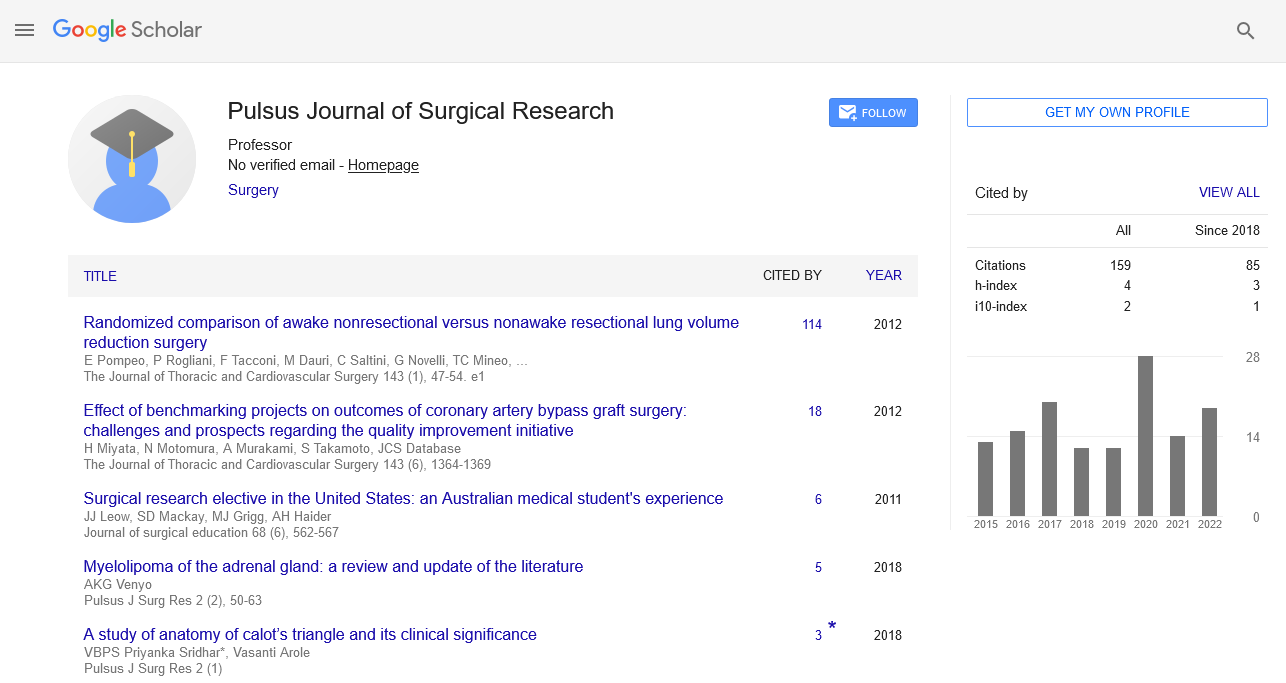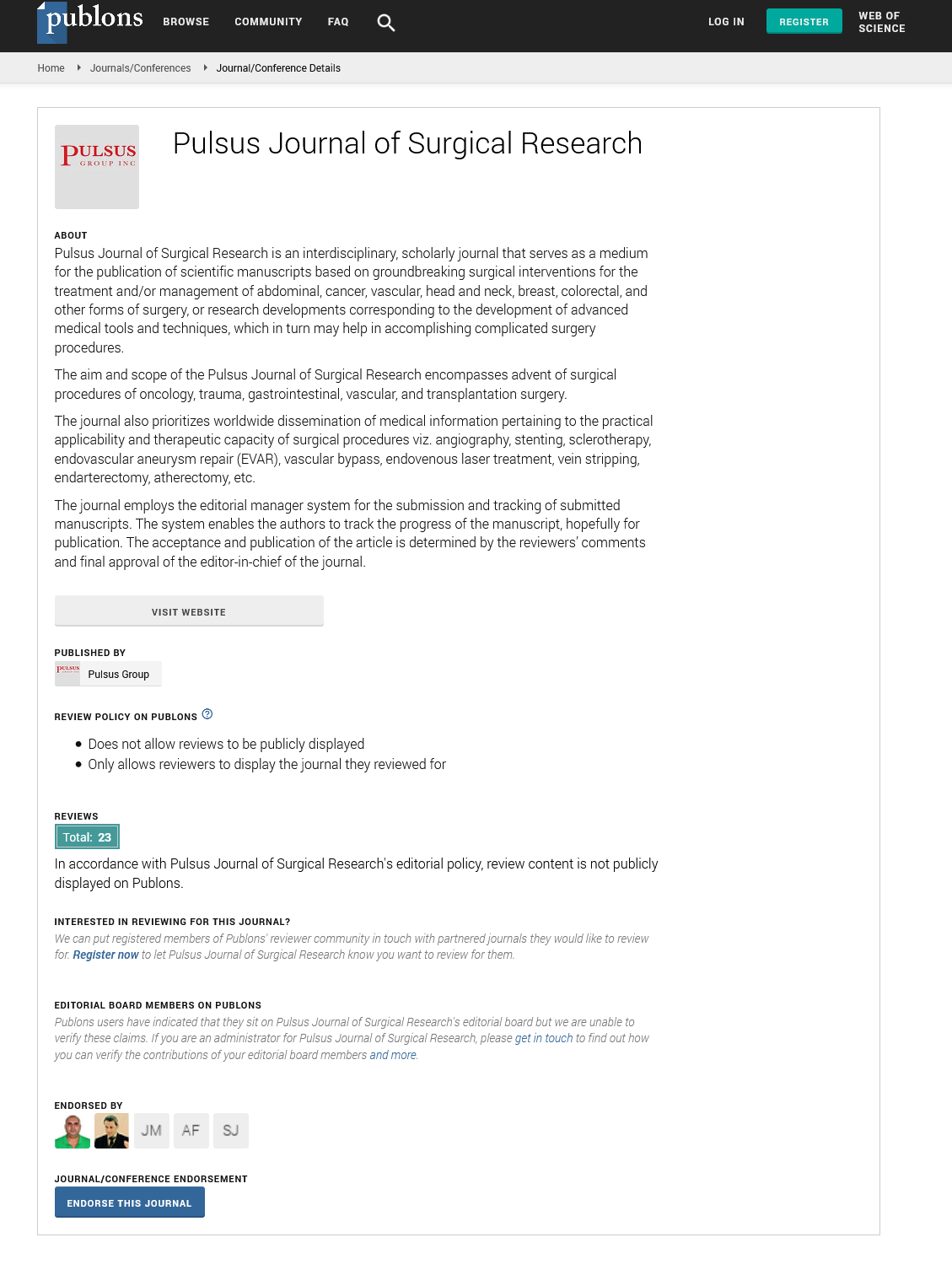Surgical oncology from the ESSO core curriculum committee
Received: 03-Oct-2022, Manuscript No. pulpjsr- 22-5800; Editor assigned: 06-Oct-2022, Pre QC No. pulpjsr- 22-5800 (PQ); Accepted Date: Oct 26, 2022; Reviewed: 18-Oct-2022 QC No. pulpjsr- 22-5800 (Q); Revised: 24-Oct-2022, Manuscript No. pulpjsr- 22-5800 (R); Published: 30-Oct-2022
Citation: Sofi A. surgical oncology from the ESSO core curriculum committee. J surg Res. 2022; 6(5):70-72.
This open-access article is distributed under the terms of the Creative Commons Attribution Non-Commercial License (CC BY-NC) (http://creativecommons.org/licenses/by-nc/4.0/), which permits reuse, distribution and reproduction of the article, provided that the original work is properly cited and the reuse is restricted to noncommercial purposes. For commercial reuse, contact reprints@pulsus.com
Abstract
Surgery is a defined specialty within the European Union of Medical Specialists. In Europe, there are still differences in training and expertise. The fundamental skills required to meet the requirements in each surgical oncology subspecialty must be coordinated. The European Society of Surgical Oncology, the European Society for Radiotherapy and Oncology, the European Society of Medical Oncology, and experts in associated subspecialties all contributed to the development of the core curriculum. The present version reaffirms and modifies the fundamental curricular framework required for candidates who are vying now and in the future and who intend to prepare for and eventually take the European fellowship test for the European Board of Surgery in Surgical Oncology. The core curriculum will develop, mature, and adapt as evidence-based care for cancer patients changes as a result of basic science, translational research, and clinical trials research, delivering ongoing improvements in cancer outcomes for patients.
Keywords
Surgical care; Virtual reality; oncology; endocrine.
Introduction
The first iteration of the ESSO Core was released more than ten years ago. The programmer was introduced. Since then, surgical oncology has advanced thanks to significant developments in surgical techniques and perioperative care, as well as in systemic medicines like immunotherapy for the treatment of melanoma. The role of surgical oncology has changed away from a general specialization in cancer surgery towards highly concentrated domains of super specialization since Professor Nereid’s initial suggestion for a core curriculum for surgical oncology trainees. Both a worldwide curriculum and a curriculum for improving comprehension of research and trials in cancer surgery have been introduced. Due to the pragmatic phenomenon of increasing differentiation and specialization in many centers and locations, the "generic" surgical oncologist has almost completely disappeared from the medical landscape. Hepatobiliary and Pancreatic Surgery, for instance, has developed into a specialized field for surgeons who only perform procedures in this extremely specific anatomical site, necessitating the development of specialized training curricula. Breast surgeons in some countries have also disassociated themselves from national surgical oncology societies. In spite of this, there are still significant differences in training and practice both within Europe and globally. If the term "surgical oncologist" even exists, surgical oncologists in many areas are currently treating a wider range of clinical conditions. Therefore, we should acknowledge the necessity for specially educated cancer surgeons while also taking into account geographical differences and, in some cases, the lack of access to cancer surgeons.
Although the subject of surgical oncology has grown too large to be contained within a single profession, there are still many parallels amongst surgical professionals working in the field. Multidisciplinary care has become increasingly significant regardless of one's area of expertise. Therefore, the modern cancer surgeon needs to have a precise and concentrated understanding of relevant subjects outside of the surgical components of therapy. The cancer surgeon must have upto-date knowledge of the most recent imaging modalities, systemic and radio therapeutic treatment choices, and cancer biology, epidemiology,and quality of life-related issues. Furthermore, a current overview of the crucial areas of interest in the main subspecialties within surgical oncology is crucial for the surgical oncology trainee who has not yet selected which direction in surgical oncology to pursue. Thus, the new core curriculum continues to use the design and format that were first used. Provides a thorough summary of all pertinent areas of surgical oncology. Notably, the curriculum won't be able to go into detail on every aspect of every malignancy. Changes in society's structures, social norms, political atmosphere, and economy all have an impact on cancer care. This was especially clear during the COVID-19 pandemic, which had a negative impact on planning, accessibility to operating rooms and critical care resources, the need to build alternative treatment pathways, and the requirement to rethink care principles in light of the various scenarios encountered across regions. Guidelines and frameworks for greater future preparedness may emerge as a result of ongoing analysis of this worldwide issue since we are still learning from this.
In addition, there is a change in how knowledge and information are transmitted. When, how, and where information is released, accessed, and shared have all been impacted by social media and virtual presence. Surgeons who treat cancer should be able to gather, process, and evaluate information from a variety of sources. Current candidates who intend to prepare for and eventually sit the European Fellowship Exam for the European Board of Surgery in Surgical Oncology should review and revise the core curriculum structure as necessary. The information provided is not meant to be thorough; rather, it is meant to provide the candidate with a general understanding of what to expect, potential areas of in-depth study, and necessary practical training. Basic concepts of oncology, disease site-specific oncology, general clinical competencies, and training recommendations are the five components. Eligibility for the surgical oncology section of the EBSQ exam. The curriculum will alter, mature, and adapt to provide the greatest evidence for patient care as research into the care of cancer patients develops through fresh basic scientific discoveries, translational implementation from bench to bedside, and increased knowledge through trials and registries. In order to one day make cancer history, lifelong students of cancer should continue to learn about and research new and improved methods of treating the condition. Expert advisers from the European Societies of Surgical Oncology, European Society for Radiotherapy and Oncology, and European Society of Medical Oncology contributed to the development of the Core Curriculum update The UEMS assures the highest standards of medical treatment and encourages the free mobility of medical specialists throughout Europe. It has specialty divisions, such as the European Board of Surgery, that represent various nations and medical specialties. Once or twice a year, the European Board of Surgery conducts a variety of Specialist Examinations. These were first introduced in a small number of subspecialist fields in 1996. The number of sub-specialist exams has grown over time to the point where they are now offered in the following fields: Hand Surgery, Breast Surgery, Coloproctological, Trauma Surgery, General Surgery, Surgical Oncology, Thoracic Surgery, Transplant Surgery, Transplant Medicine, and Transplant Coordination. Breast Surgery is the newest sub-specialist field to provide an EBSQ.
Two of these exams are administered by the European Society for Surgical Oncology in cooperation with the EBS: the EBSQ in Breast Surgery (a cooperative project with the European Society of Breast Cancer Specialists, EUSOMA) and the European Board of Surgery Qualification in Surgical Oncology. The purpose of these certifications is to demonstrate subject-matter competence at a level that would be recognized in all European nations and serve as a benchmark for quality. A formal evaluation of the experience, credentials and academic outputs constitutes the first step in the assessment process for the EBSQ in all specialty areas. Diagnosis The requirements for eligibility are strict but differ widely between sub-specialist fields. Candidates must have finished specialized training in their preferred surgical field. Candidates are required to produce a logbook showing how many instances of specific index processes they have handled. The exam board may evaluate these objectively or more objectively by comparing them to a set of predetermined index cases. Candidates must submit a CV outlining the training facilities they have attended, along with information on the training duration and quality. Typically, candidates are required to have finished their general surgical training and then completed a varying amount of training in centers of expertise in their specialty recognized on a national level. Candidates must have at least one of their trainer’s sign recommendations for them.
Core curricula, which are meant to act as knowledge models for specialized surgeons, run concurrently with the exams. Again, depending on the sub-specialty area, these differ in the level of detail offered. The training of surgical oncologists is offered via general surgery training programs authorized by European member states, typically complemented by a senior-level fellowship over a long period of time in a center of excellence. The latter will provide the trainee with advanced-level surgical oncology competencies. The following should be included in such programs: participation in multidisciplinary team meetings on a regular basis. Regular business interactions with radiation and medical oncologists. Access to MRIs and PET-CTs, among other high-quality medical imaging. A comprehensive range of extended examinations, including cytogenetics, mutational analysis, and immunohistochemistry, are available, along with high-quality pathology services.
Regular progress evaluations including formative and summative assessments of surgical technical skills as well as non-surgical comcompetencieske diagnosis, decision-making, and communication skills. The ESSO Core Curriculum is meant to serve as a guide for the necessary level of knowledge for both the EBSQ surgical oncology examination as well as for the practice of surgical oncology. Sandrucci and Edhemovic are Sergio.
A surgical oncologist must complete their training in a completely interdisciplinary setting where pathologists, radiologists, surgical, medical, and radiation oncologists, as well as other specialties engaged in the treatment and study of cancer, regularly interact. In a perfect world, every student would complete at least some of their training at a European center of excellence. As their experience grows, they should receive hands-on instruction in minor, intermediate, major, and complex major surgery from qualified and experienced trainers. They should receive immediate verbal and written feedback for all subspecialist index operations, and they should keep a logbook of all patients. Based on their training and feedback records, trainees should be able to show that they can do difficult major surgery in their chosen specialty to a high standard and unattended by the time they have finished their training. a two-year clinical surgical oncology residency followed by a surgical oncology research fellowship
Candidate submission requirements include a completed application form, a curriculum vitae, and a letter of support from their head of department. With this application, you must also provide a log book of surgical oncology operations that spans at least three years and details the candidate's roles as a principal surgeon, first assistant, principal surgeon helped by the trainer, and principal surgeon not assisted by the trainer. Please be aware that all operations must be grouped, sorted, and counted by operation type and candidate position at the beginning of the logbook. A surgical oncologist must complete their training in a completely interdisciplinary setting where pathologists, radiologists, surgical, medical, and radiation oncologists, as well as other specialties engaged in the treatment and study of cancer, regularly interact. In a perfect world, every student would complete at least some of their training at a European center of excellence.






